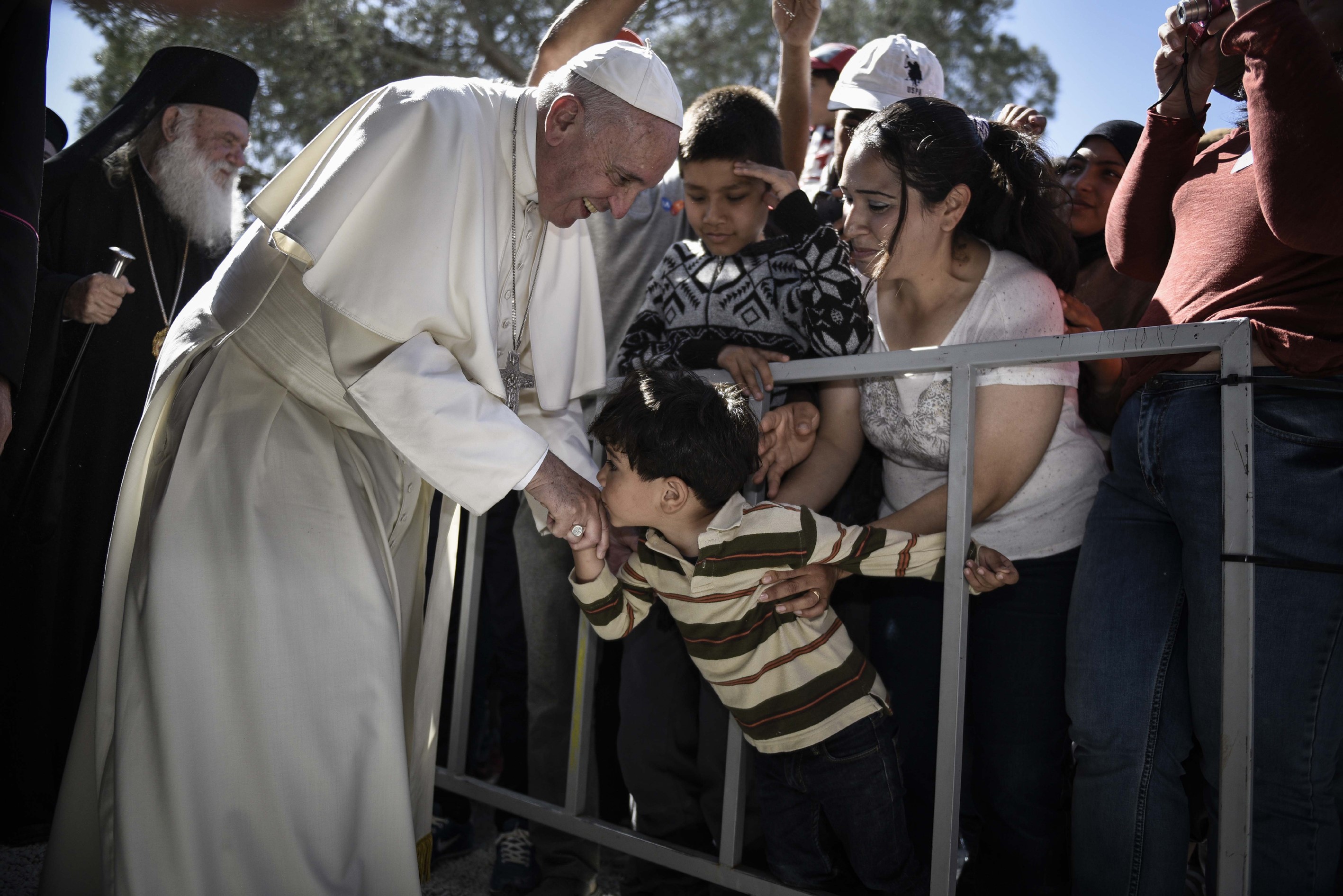The visit
The day of Francis in Lesvos with Bartholomew I and Ieronymous II. The message to refugees of “Mòria’s Refugee Camp”: “You are not alone”, “Don’t lose hope.” The gesture of wreaths thrown into the sea. The decision of accompanying back to Rome, on the papal plane, three families of refugees from Syria, 12 people including six children.

“Wake us from the slumber of indifference, open our eyes to their suffering, and free us from the insensitivity born of worldly comfort.” Two thousand five hundred people closed in the Center of Moria, refugees, asylum-seekers. Many children, young boys and girls. Pope Francis entered the camp with Ecumenical Patriarch Bartholomew, with the Archbishop of Athens Ieronymos. Refugees are not numbers. They are people with faces, names and stories; men and women with their suffering, with the wounds caused by wars, violence, deprivation, humiliation.
A trip different from other trips
the Pope told journalists on the plane, a journey marked by sadness. We are going to visit all those people who are suffering and have no place to go. Those were the feelings of Pope Francis during the journey. We are all migrants, Francis recalled, slowly walking across the premises of the refugee-centre, to shake the highest numbers of hands, to caress wrinkled faces, scarred by suffering, faces of children and youths.
 A woman on her knees, weeping, asked the Pope to help her. A man with a broken voice asked for a blessing. He wouldn’t stop crying, asking. Then a child came up with a drawing for the Pope, others followed. “I’ll bring them with me”, Francis said. “I’ll keep them on my desk.” Francis held hands with gestures of tenderness and sharing:
A woman on her knees, weeping, asked the Pope to help her. A man with a broken voice asked for a blessing. He wouldn’t stop crying, asking. Then a child came up with a drawing for the Pope, others followed. “I’ll bring them with me”, Francis said. “I’ll keep them on my desk.” Francis held hands with gestures of tenderness and sharing:
“We have come to call the attention of the world to this grave humanitarian crisis, imploring a solution.”
He went on:
“We hope that the world will heed these scenes of tragic and desperate need, and respond in a way worthy of our common humanity.”
The Archbishop of Athens Ieronymos denounced “policies that have led these people to find themselves in deadlocked situations.” He recalled “the bankruptcy of humanity and solidarity shown by Europe in recent years to these people, and not only to them.”
People, not numbers.
Patriarch Bartholomew said: “We have travelled here to look into your eyes, to hear your voices, and to hold your hands. We have travelled here to tell you that we care. We have travelled here because the world has not forgotten you.”
“Don’t lose hope”, Pope Francis told them.
He slowly walked across Moria’s refugee camp, with feelings of suffering. His steps conveyed closeness, solidarity – a word that is feared by the modern world – he said in his speech at the Astalli Centre, that gives shelter to refugees and asylum-seekers in Rome – inviting to undertake concrete commitments for these brothers and sisters of ours. Many of them have crossed the sea to reach Europe, the homeland of human rights.
For many of them Europe remains a dream. They cried it out to Francis. They asked him to help them reach their parents in Germany and many other nations. Thus the appeal contained in the Joint Statement signed by the three religious leaders: “We wish to do our part toward giving these people a humane, dignified reception”.
Appeal to Europe because that of migrants is a global crisis, one of the most serious humanitarian crises since the end of the Second World War that shed blood across the Old Continent.
“We all know from experience how easy it is for some to ignore other people’s suffering and even to exploit their vulnerability”, Francis said.
But they are not numbers, these men and women. Their suffering questions us. So much so that Francis, on the return journey to Rome, took a small group of refugees with him on his aircraft as he left the island, twelve refugees, all of Islamic faith. Three families, six children.
Francis prayed at the port, where he threw a laurel wreath in the sea, with Bartholomew and Ieronymos.
He had made the same gesture in Lampedusa in July 2013. He repeated that gesture in Lesvos, in memory of countless victims buried in this cemetery that is the Aegian Sear. The Pope prayed to the Lord: “In caring for them may we seek a world where none are forced to leave their home and where all can live in freedom, dignity and peace.”